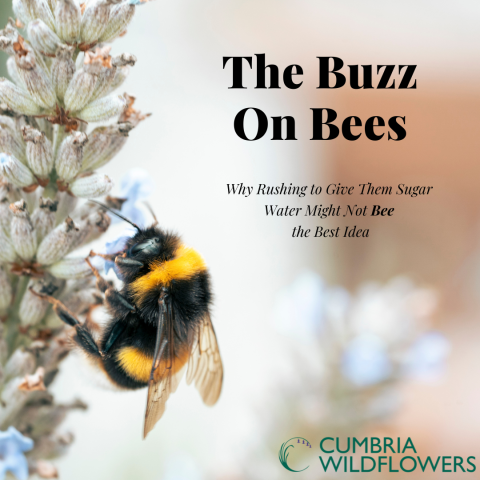The Buzz on Bumble Bees: Why Rushing to Give Them Sugar Water Might Not Bee the Best Idea
Bumble bees, with their fluffy bodies and gentle buzz, are essential pollinators crucial for maintaining the balance of ecosystems and supporting agricultural productivity. However, encountering a seemingly tired or lethargic bumble bee might evoke a knee-jerk reaction to help by offering sugar water. While the intention is noble, the action may not always be the best course of action. In this blog, we'll delve into why rushing to give a bumble bee sugar water might not be as beneficial as it seems.
The Importance of Bumble Bees:
Before we discuss why offering sugar water might not be advisable, it's important to understand the significance of bumble bees. These fuzzy insects are proficient pollinators, playing a vital role in the reproduction of many plants, including numerous crops that humans rely on for food. Without bumble bees and other pollinators, the ecosystem would suffer, leading to a decline in biodiversity and agricultural yields.
The Temptation to Help:
Encountering a bumble bee resting on a flower or seemingly struggling to fly can evoke a natural instinct to assist. It's not uncommon for well-intentioned individuals to think that providing sugar water can help revive an exhausted bee, providing it with the energy it needs to continue its journey.
Why Rushing Isn't Ideal:
While the impulse to help is commendable, rushing to give a bumble bee sugar water might not be the best approach for several reasons:
Natural Behaviours: Bumble bees, like many other insects, have natural behaviours and processes. Resting or appearing lethargic might simply be part of their natural life cycle or behaviour. Interfering with this could disrupt their natural rhythms.
Potential Harm: Introducing foreign substances like sugar water to a bumble bee could potentially harm it. The sugar concentration might not be suitable, leading to issues such as dehydration or imbalance. Additionally, there's a risk of introducing pathogens or contaminants into the bee's system.
Stress: Bumble bees, like all creatures, can experience stress. Handling them or attempting to force-feed them sugar water could cause unnecessary stress, which may further compromise their health.
Alternative Ways to Help:
Rather than rushing to give sugar water, there are alternative ways to support bumble bees and other pollinators:
Plant Bee-Friendly Gardens: Create gardens rich in nectar-producing flowers to provide bumble bees with natural food sources.
Provide Shelter: Offer nesting sites for bumble bees by leaving undisturbed areas in gardens or providing bee hotels.
Avoid Pesticides: Minimise the use of pesticides and chemicals in your garden to protect bumble bees and other beneficial insects.
Educate Others: Spread awareness about the importance of bumble bees and the ways to support them without interfering in their natural behaviour.
Conclusion:
While the impulse to help bumble bees is understandable, rushing to give them sugar water might not be the best approach. These resilient insects have evolved to thrive in their environments, and interfering with their natural behaviours could do more harm than good. Instead, focus on creating bee-friendly habitats and promoting practices that support their well-being without unnecessary intervention. By respecting the natural rhythms of bumble bees, we can ensure their continued vital role as pollinators in our ecosystems.
To help you get started with creating your own pollinator habitat, have a look at our pollinators 40 plug plant mix >> https://www.cumbriawildflowers.co.uk/habitats/pollinators40plugplantsmix
When you subscribe to the blog, we will send you an e-mail when there are new updates on the site so you wouldn't miss them.



Comments